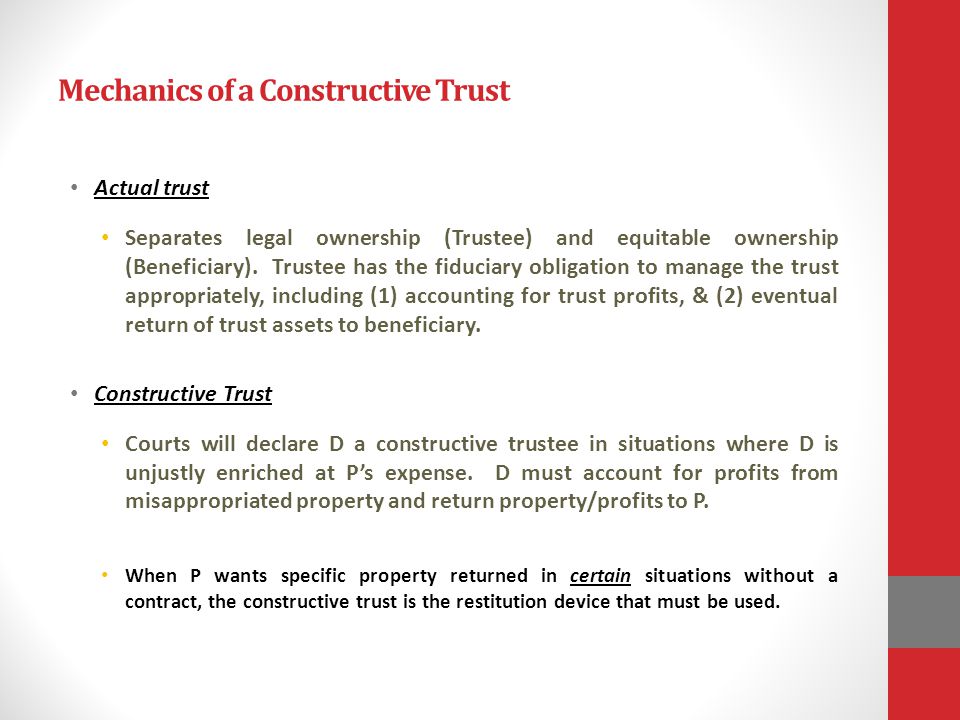Discovering How Does a Useful Count On Operate In Home and Asset Disputes
The concept of a positive depend on serves as an essential mechanism within property and possession conflicts, addressing scenarios where one event has actually unfairly profited at the expense of one more. This equitable solution not only looks for to correct injustices however likewise stresses the importance of intention and payment in identifying rightful ownership. By checking out the nuances of exactly how positive trusts run, one can reveal the complexities that usually arise in legal contexts. What implications do these depends on hold for future conflicts, and how might they affect the landscape of residential or commercial property law?

Interpretation of Constructive Trust
A constructive trust arises when a court establishes that it is required to prevent unjustified enrichment, often in circumstances where a celebration has actually acquired residential or commercial property through wrongful methods or under situations that call for equitable alleviation. This legal treatment is not formally developed by the events entailed; instead, it is imposed by the court to deal with situations where fairness and justice demand treatment.
Positive counts on are often conjured up in cases involving fraud, breach of fiduciary obligation, or various other types of misconduct. As an example, if a specific wrongfully acquires residential or commercial property that truly comes from an additional, the court may enforce a constructive trust fund to guarantee that the crook holds the residential or commercial property for the benefit of the rightful owner. This legal principle operates the principle that it would certainly be inequitable for the wrongdoer to maintain the benefits originated from their misbehavior.
Inevitably, a useful count on functions as an effective device in property disagreements, enhancing the idea that possession ought to mirror not only lawful title yet also moral considerations. By identifying the demand for fair relief, courts guarantee that justice prevails in the distribution of building and assets.
Secret Principles of Constructive Trust Funds
While the application of useful depends on might vary depending upon particular circumstances, a number of vital concepts regularly underpin their enforcement in residential or commercial property disputes. First of all, the concept of unfair enrichment plays a crucial role; a positive count on is often enforced to avoid one celebration from unjustly benefiting at the expenditure of one more. This concept emphasizes the equitable nature of useful trusts, highlighting that legal ownership does not constantly relate to rightful ownership.
Second of all, the need of a fiduciary connection is significant. What Is A Constructive Trust. Useful trust funds frequently develop in contexts where one celebration has an obligation to act in the finest interests of an additional, such as in collaborations or joint endeavors. Breaches of this responsibility can trigger the imposition of a useful trust to protect the aggrieved party's interests
Additionally, the teaching of intention is important, as courts take into consideration whether the celebrations intended to create a trust-like relationship, even if not officially documented. Finally, the principle of equitable remedies highlights that constructive trust funds offer to supply alleviation that aligns with fairness and justice, making certain that the rightful claimant can restore residential or commercial property or assets that they are entitled to, in spite of legal title residing somewhere else.
Applications in Residential Property Disputes
Constructive trust funds find significant application in residential or commercial property conflicts, particularly when resolving concerns of ownership and fair rights. These counts on emerge in scenarios where one celebration holds home under problems that, in fairness and justice, must benefit one more party. The fair remedy of a constructive depend on stops unjustified enrichment by identifying the payments of a party who, in spite of doing not have formal title, has a legit case to the building.
One usual situation includes cohabiting partners who contribute to the purchase or upkeep of home but are not on the title action. In such situations, the courts may impose a useful trust to reflect the events' objectives and payments, thereby guaranteeing that the non-titled partner gets a reasonable share of the home.
In addition, useful trust funds can be crucial in conflicts including inheritance or household property, where a decedent's intent may not have been officially documented. Courts might infer a positive depend recognize the decedent's desires and fix potential injustices among beneficiaries. Generally, constructive trusts act as a vital device in balancing civil liberties and making sure equitable results in residential or commercial property conflicts, enhancing the concept that fairness should read more dominate in possession issues.
Study and Examples
Residential property disagreements involving useful depends on can frequently be shown via real-life instance researches that highlight the complexities and nuances of equitable legal rights. One significant instance is * Gissing v. Gissing *, where a wife declared a useful passion in the household home, saying that her financial contributions during the marital relationship warranted a useful trust fund. The court ultimately ruled in her favor, developing that her contributions developed an equitable passion regardless of the residential property being entirely in her partner's name.
Another illustrative case is * Thompson v. Thompson *, where brother or sisters challenged the possession of a household estate after their parents' death. One sibling had actually maintained and improved the property, asserting that these activities justified a useful trust fund. The court identified the sibling's initiatives and located that a useful count on was necessary to avoid unfair enrichment, thus awarding them a share in the estate.
These cases exhibit exactly how constructive counts on offer to attend to situations where legal possession does not mirror the true fair rate of interests of the parties entailed, emphasizing the importance of intent and contributions in identifying rightful cases in home conflicts.
Lawful Ramifications and Factors To Consider
Numerous legal implications and considerations visit this web-site emerge when dealing with useful rely on residential property disagreements. Foremost, the facility of a positive count on commonly pivots on the existence of an unjustified enrichment, where one event benefits at the cost of one more. This principle requires a complete exam of the connection in between the celebrations and the situations that caused the claimed inequity.
In addition, courts typically call for clear proof of the claimant's contribution to the residential property or asset concerned, which can consist of financial investments, labor, or various other kinds of support. The problem of proof rests with the claimant, requiring precise documents and testimony to confirm their claims.
Moreover, the timing of insurance claims is important, as statutes of restrictions might limit the capacity to develop a positive count on after a specific period. Lawful advice should navigate these time restrictions thoroughly to make sure that cases are filed in a prompt fashion.
Finally, the capacity for disagreements over the intent behind property transfers can make complex issues better, demanding a nuanced understanding of both statutory legislation and case law to efficiently support for a customer's rate of interests in positive count on insurance claims.
Conclusion

The idea of a constructive trust fund serves as a crucial device within building and property disagreements, attending to situations where one party has unjustly profited at the cost of an additional. If an individual wrongfully takes belongings of home that truly belongs to one more, the court might enforce a constructive count on to ensure that the criminal holds the building for the advantage of the rightful owner.Useful counts on find considerable application in home disagreements, particularly when addressing problems of ownership and equitable legal rights. On the whole, useful trust funds offer as an important device in balancing rights and making certain equitable end results in residential property disagreements, enhancing the concept that fairness have to dominate in ownership matters.
In recap, constructive trust funds serve as vital equitable remedies in residential or commercial property and asset disagreements, attending to unjustified enrichment by identifying the contributions of events entailed. - my company What Is A Constructive Trust